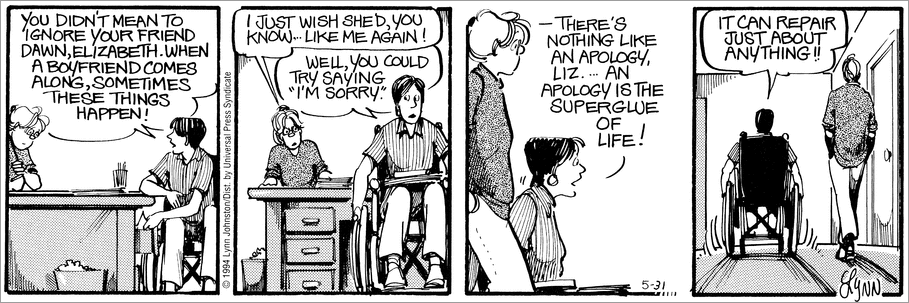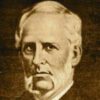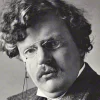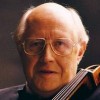I have often tried to say to you personally what I am about to write, but was prevented by a kind of almost clownish bashfulness. Now that I am not in your presence I shall speak out more boldly: a letter does not blush.
[Coram me tecum eadem haec agere saepe conantem deterruit pudor quidam paene subrusticus, quae nunc expromam absens audacius; epistula enim non erubescit.]
Marcus Tullius Cicero (106-43 BC) Roman orator, statesman, philosopher
Epistulae ad Familiares [Letters to Friends], Book 5, Letter 12, sec. 1 (5.12.1), to Lucius Lucceius (55 BC) [tr. Shuckburgh (1899), # 108]
(Source)
Opening lines of the letter. Cicero then brazenly asks Lucceius, an orator and literary figure, to prominently mention Cicero's consulship in the history he is writing, as had been promised -- and if, as a friend, Lucceius embellished things, well, that was fine with Cicero, too.
(Source (Latin)). Alternate translation:I Determine freely, to open my minde unto you by letters, which doe not blush; seeing in presence I never durst doe it, through a certaine modesty, I cannot say, but rather a rudenesse.
[tr. Webbe (1620)]I have frequently had it in my intentions to talk with you upon the subject of this letter; but a certain aukward modesty, has always restrained me from proposing in person, what I can with less scruple request at this distance: for a letter, you know, spares the confusion of a blush.
[tr. Melmoth (1753), 1.20]A certain sense of shame has often halted me when I have been minded to take up with you face to face the topic which I now will set forth more boldly in your absence; for a letter does not blush.
[tr. McKinlay (1926)]Often, when I have attempted to discuss this topic with you face to face, I have been deterred by a sort of almost boorish bashfulness; but now that I am away from you I shall bring it all out with greater boldness; for a letter does not blush.
[tr. Williams (Loeb) (1928)]Although I have more than once attempted to take up my present topic with you face to face, a sort of shyness, almost awkwardness, has held me back. Away from your presence, I shall set it out with less trepidation. A letter has no blushes.
[tr. Shackleton Bailey (1978), # 22]I have often tried to speak of these matters with you in person, but an almost clownish sense of shyness has scared me off; now, being away from you, I shall declare them more boldly, since a letter does not blush.
[tr. @aleator (2013)]
Quotations about:
apology
Note not all quotations have been tagged, so Search may find additional quotes on this topic.
As it is, wine drove me out of my senses. I admit I wronged you, but the wrong was not intentional.
[νοϋ δ’ οίνος έξεστησέ μ’ δμολογώ δέ σε άδίκείν, τὸ δ’ αδίκημ’ ἐγένετ’ οὐχ ἑκούδίον.]
Euripides (485?-406? BC) Greek tragic dramatist
Auge [Αὐγῃ], frag. 272b (TGF) (c. 408 BC) [tr. Collard/Cropp (2008)]
(Source)
Heracles apologizing (sort of), to Auge for raping her, one of the only such apologies in ancient Greek drama.
Nauck frag. 265, Barnes frag. 6, Musgrave frag. 8. (Source (Greek)). Alternate translation:My senses are disorder'd by the fumes
Of wine: yet will I own that I have wrong'd thee,
Tho' this be an involuntary wrong.
[tr. Wodhall (1809)]
I will apologise for many things that I have done, but I will not apologise for the things that should never be apologised for. It is a little theory of mine that has much exercised my mind lately, that most of the problems of this silly and delightful world derive from our apologising for those things which we ought not to apologise for, and failing to apologise for those things for which apology is necessary.
Stephen Fry (b. 1957) British actor, writer, comedian
Moab Is My Washpot, “Falling In,” ch. 3 (1997)
(Source)
JONES: Woke me out of a rotten sleep. Asinine reflex. Idiotic. Endless apologies.
Alistair MacLean (1922-1987) Scottish novelist (pen name Ian Stuart)
Ice Station Zebra, Screenplay (1968) [with Douglas Heyes, Harry Julian Fink, W.R. Burnett]
(Source)
Apology by British agent "David Jones" after he nearly shoots a sailor who awakens him. The screenplay was loosely based upon MacLean's 1963 novel of the same name; these lines do not appear there.
Apologies rebuild the bridge that gets severed when we hurt someone else, either intentionally or by accident. Apologies don’t require us to grovel or wallow in guilt. We simply acknowledge that our actions were insensitive, unkind, or harmful and say we are sorry.
Charlotte Kasl (d. 2021) American psychologist and author
If the Buddha Dated: A Handbook for Finding Love on a Spiritual Path (1999)
(Source)
Right actions for the future are the best apologies for wrong ones in the past — the best evidence of regret for them that we can offer, or the world receive.
Tryon Edwards (1809-1894) American theologian, writer, lexicographer
A Dictionary of Thoughts (1908)
(Source)
Often wrongly quoted, "... best apologies for bad actions in the past."
Never apologize for showing feeling, my friend. Remember that when you do so, you apologize for truth.
Benjamin Disraeli (1804-1881) English politician and author
Contarini Fleming, ch. 13 (1832)
(Source)
We have all heard enough to fill a book about Dr. Johnson’s incivilities. I wish they would compile another book consisting of Dr. Johnson’s apologies. There is no better test of a man’s ultimate chivalry and integrity than how he behaves when he is wrong; and Johnson behaved very well. He understood (what so many faultlessly polite people do not understand) that a stiff apology is a second insult. He understood that the injured party does not want to be compensated because he has been wronged; he wants to be healed because he has been hurt.
APOLOGIZE, v.i. To lay the foundation for a future offense.
Ambrose Bierce (1842-1914?) American writer and journalist
“Apologize,” The Cynic’s Word Book (1906)
(Source)
Included in The Devil's Dictionary (1911).
The greatest achievement in my life in terms of morality is that I can apologize to someone I have wronged. I can bow my head and ask for forgiveness. I think everyone should learn to do this, everyone should realize that, far from humiliating, it elevates the soul.
Apologizing. — A very desperate habit, — one that is rarely cured. Apology is only egotism wrong side out. Nine times out of ten, the first thing a man’s companion knows of his shortcoming is from his apology. It is mighty presumptuous on your part to suppose your small failures of so much consequence that you must make a talk about them.
Men hate more steadily than they love; and if I have said something to hurt a man once, I shall not get the better of this by saying many things to please him.
Samuel Johnson (1709-1784) English writer, lexicographer, critic
In James Boswell, Life of Samuel Johnson, “September 15, 1777” (1791)
(Source)
I don’t believe in twisting yourself into knots of excuses and explanations over the food you make. When one’s hostess starts in with self-deprecations such as “Oh, I don’t know how to cook …,” or “Poor little me …,” or “This may taste awful …,” it is so dreadful to have to reassure her that everything is delicious and fine, whether it is or not. Besides, such admissions only draw attention to one’s shortcomings (or self-perceived shortcomings) and make the other person think, “Yes, you’re right, this really is an awful meal!” Maybe the cat has fallen into the stew, or the lettuce has frozen, or the cake has collapsed — eh bien, tant pis!
Julia Child (1912-2004) American chef and writer
My Life In France, “Le Cordon Bleu,” sec. 2 (2006)
(Source)
"Oh well, too bad."





















